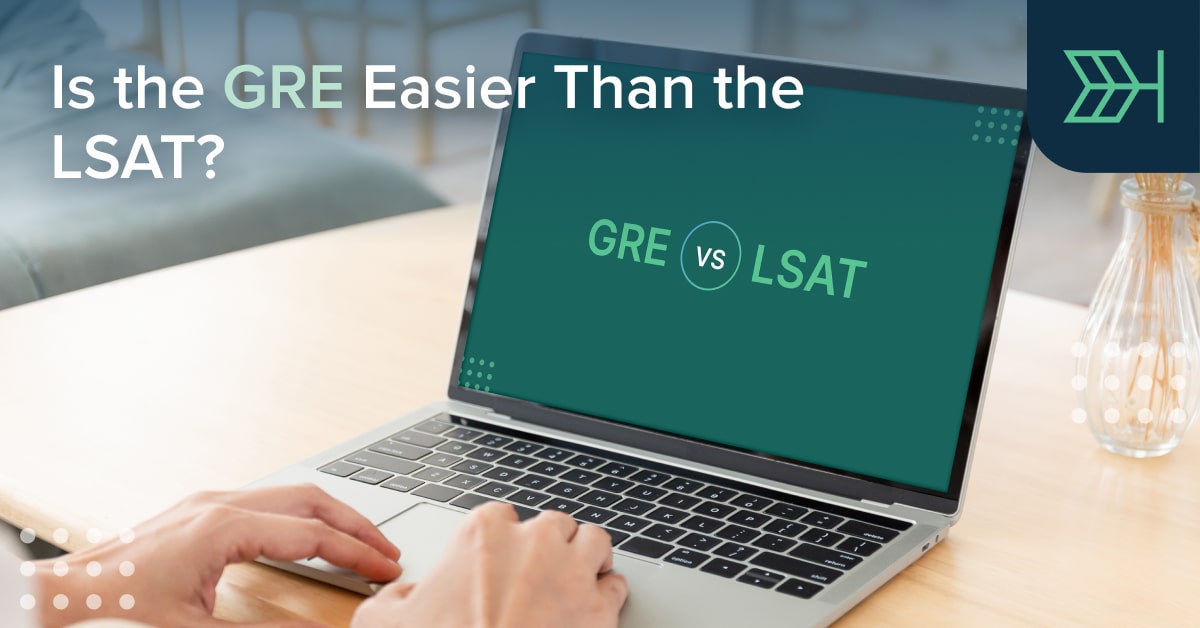Last Updated on April 17, 2023
People planning to take the GRE General Test to apply to graduate school often wonder, “How difficult is GRE Verbal?” The level of difficulty of the GRE Quant section may seem straightforward to understand. In contrast, assessments of the difficulty of the Verbal section can vary widely. One person will say she dreaded the Verbal section and had to prepare a lot to achieve her score goal. Another will report finding GRE Verbal relatively easy. So, what’s the truth about GRE Verbal?
In this post, we’ll assess the difficulty of GRE Verbal. We’ll consider what makes it difficult or not so difficult. We’ll also discuss some key aspects of preparing for it effectively.
Here are the topics we’ll cover:
Let’s begin by reviewing the basics of the GRE Verbal section.
The Basics of the GRE Verbal Section
According to ETS, the maker of the GRE, the Verbal Reasoning section of the GRE tests skill in the following:
- analyzing and evaluating written material and synthesizing information obtained from it
- analyzing relationships among parts of sentences
- recognizing relationships among words and concepts
The Verbal section tests those skills by using four main types of questions:
- Text Completion
- Sentence Equivalence
- Reading Comprehension
- Critical Reasoning (a subtype of Reading Comprehension)
Text Completion questions ask which words most logically fill blanks in sentences.
Sentence Equivalence questions also involve determining which words logically fill blanks. However, they have an additional dimension. The correct answers to Sentence Equivalence questions are pairs of words that produce sentences with equivalent meanings.
Reading Comprehension questions ask about a variety of aspects of written passages, such as the main idea, details, purposes of sentences, and the meanings of words used.
Critical Reasoning questions ask about a variety of aspects of arguments or scenarios presented in short written passages. These aspects include assumptions on which arguments depend, ways that arguments could be weakened or strengthened, conclusions supported by arguments, and explanations for seemingly paradoxical situations.
On the GRE, Verbal questions appear in two 20-question sections. So, the entire Verbal portion of the GRE has a total of 40 questions. The first of the two 20-question sections is always of medium-level difficulty. The second section is of easy, medium, or hard difficulty depending on how you perform on the first section.

 KEY FACT:
KEY FACT:
The GRE presents a total of 40 Verbal questions split into 2 sections.
Having covered the basics of GRE Verbal, let’s now assess the difficulty of the Verbal section. We can start by considering the difficulty of Text Completion and Sentence Equivalence.
How Difficult Are Text Completion and Sentence Equivalence?
As we just discussed, Text Completion and Sentence Equivalence questions ask which words logically fill blanks in sentences. So, answering these questions seems pretty simple. However, these questions can be challenging for a few reasons.
The Use of Sophisticated Vocabulary
The most obvious reason why Text Completion (TC) and Sentence Equivalence (SE) questions are challenging is that the answer choices often aren’t basic words. Rather, they’re fairly sophisticated words that would appear in scholarly articles. That is not to say that these “GRE words” are very uncommon. They’re not. However, even an avid reader may be unsure of the definitions of many GRE words.
Of course, anyone preparing for the GRE test can study these words. So, the fact that TC and SE questions use these words doesn’t make these question types impossible to master. At the same time, to be confident in answering TC and SE questions, you need to know around 1,200 GRE vocab words. So, learning the words can be a fairly significant task, particularly for nonnative speakers of English.
Memorizing more than 1,000 GRE words is tedious and can take time. However, it’s also straightforward and doable by people who plan to attend graduate school. In other words, it’s not brutally difficult. So, we could rate the difficulty of the vocabulary aspect of TC and SE medium-hard.

 KEY FACT:
KEY FACT:
Mastering GRE Text Completion and Sentence Equivalence requires knowing about 1,200 fairly sophisticated words.
The Need for Careful Analysis of Sentences
Another aspect of TC and SE that makes them challenging is that the reasons why certain words logically fill the blanks and others don’t aren’t obvious. In other words, you aren’t home free in TC and SE once you’ve learned GRE vocabulary words. Rather, you have to learn how the GRE signals which words work and how to apply that knowledge to get TC and SE questions correct consistently.
In fact, in some cases, finding the correct answer to a multi-blank TC question requires first using information in the sentence and then using the relationships between the answer choices to determine which choice is correct. Overall, the fact that TC and SE questions are fill-in-the-blank questions doesn’t mean they’re basic.
At the same time, through learning how these questions work and practicing, it’s possible for virtually anyone to master the logical analysis required for TC and SC. So, we could rate the difficulty of the logical analysis aspect of TC and SE questions medium, and possibly medium-hard for the hardest ones.

 KEY FACT:
KEY FACT:
Correctly answering TC and SE questions requires carefully analyzing sentences to determine which words correctly fill the blanks.
Incorrect Choices That Take Advantage of Cognitive Biases
A final reason why TC and SE questions are challenging is that they require us not only to find correct answers but also to avoid tempting incorrect choices. The incorrect choices are tempting because they seem to logically fill the blanks even though they don’t really.
That said, learning to avoid these trap choices is relatively straightforward. You simply must learn what they are and learn to tell the difference between a choice that seems to logically fill the blank and one that actually does. So, we could rate the level of difficulty of dealing with the incorrect choices in TC and SE questions medium.

 KEY FACT:
KEY FACT:
In TC and SE questions, incorrect choices often appear to be correct.
Let’s now assess the difficulty of GRE Reading Comprehension.
How Difficult Is Reading Comprehension?
As we discussed earlier, GRE Reading Comprehension (RC) involves reading passages and answering questions of various types about the passages.
Most GRE RC passages aren’t very long — many of them are only one or two paragraphs. So, generally, the length of the passages doesn’t make them challenging.
However, like Text Completion and Sentence Equivalence, GRE RC tends to involve fairly sophisticated vocabulary. Also, the more difficult passages are dense and use long sentences. So, some passages may be somewhat difficult to comprehend.
Meanwhile, like TC and SE questions, GRE RC questions are challenging because their incorrect choices are often written to appear correct. So, deciding which choice is actually correct takes carefully considering details of the passage and answer choices to determine what is supported by the passage, as opposed to what seems supported but isn’t.
The combination of sophisticated vocabulary, dense writing, and tricky questions makes GRE RC fairly challenging. Nevertheless, vocabulary can be memorized. Also, with a reasonable amount of effort, skill in reading dense writing can be developed, and ways of correctly answering tricky RC questions can be learned.
So, the difficulty of GRE Reading Comprehension fits the fact that the GRE is a graduate school entrance exam. In other words, it’s challenging, but it’s also masterable for people who plan to apply to graduate school. Thus, we could say that the difficulty level of GRE RC ranges from medium for easier passages and questions to medium-hard for harder passages and questions.

 KEY FACT:
KEY FACT:
GRE RC is somewhat challenging because of the ways the passages and answer choices are written but is masterable for graduate school applicants.
Let’s now discuss the difficulty of GRE Critical Reasoning.
How Difficult Is Critical Reasoning?
You may have heard that some of the hardest GRE Verbal questions are Critical Reasoning (CR) questions. As we discussed earlier, a CR question involves a short passage and asks us to find an answer that has a particular logical relationship with what the passage says.
In my opinion, GRE Critical Reasoning questions aren’t super hard. They’re easier than GMAT Critical Reasoning questions and LSAT Logical Reasoning questions. The reasons why CR answer choices are incorrect or correct aren’t particularly hard to discern. However, many people say that GRE CR questions are hard. So, what’s going on?
The thing is, since there are only a few CR questions on a given GRE, most people don’t prepare for CR much. Of course, what people don’t prepare for much seems hard to them. Imagine if people did just a few Exponents practice questions or studied Quantitative Comparison for just an afternoon. Then, people would be saying how hard those types of questions are.
I think if people prepared more for GRE Critical Reasoning, they’d find it easier than they do. So, I think we can rate GRE CR medium to medium-hard in difficulty.

 KEY FACT:
KEY FACT:
GRE CR is easier than GMAT CR and LSAT Logical Reasoning.
So, we’ve seen a pattern as we’ve considered the different types of GRE Verbal questions. We’ve found that, in general, the difficulty level of mastering the questions is medium to medium-hard. However, what about the section as a whole? How hard is it to get a relatively strong score on GRE Verbal? Let’s consider the answer to that question now.
How Hard Is It to Get 160 on the GRE Verbal Section?
160 is considered a very good GRE Verbal score, a score high enough for most top schools. So, one way to assess the difficulty of GRE Verbal is to consider how hard it is to score 160.
Your GRE Verbal score is calculated by adding the following to 130: a point for every Verbal question you get correct, along with at least 2 bonus points (if you’re scoring high). So, to score 160 on GRE Verbal, you need to get around 28 out of the 40 Verbal questions correct. In other words, you can miss 12 Verbal questions and score 160.
So, you can miss the 3 hardest TC questions, the 3 hardest SE questions, the 4 hardest RC questions, and 2 out of the 3 CR questions on your GRE and score 160 on GRE Verbal. Seen that way, scoring 160 on GRE Verbal starts to sound easy.
That said, even with the 12 hardest questions out of the picture, you’ll still have some pretty tricky Verbal questions to deal with. So, getting enough questions correct to score 160 isn’t easy.
A 160 is an 85th percentile Verbal GRE score, so about 15 percent of GRE scores are 160 or higher. Thus, given that at least around a quarter of GRE test-takers retake the test and that most people score higher on their retakes, we can conclude that around 20 percent of GRE test-takers score 160 or higher. The fact that around 20 percent of test-takers score 160 or higher is consistent with the idea that the level of difficulty of scoring 160 on GRE Verbal is medium-hard.

 KEY FACT:
KEY FACT:
About 20 percent of GRE test-takers score 160 or higher.
Another often asked question is whether GRE Verbal is harder than GMAT Verbal.
Is GRE Verbal Harder Than GMAT Verbal?
Regarding whether GRE Verbal is harder than GMAT Verbal, the answer depends on where a test-taker’s strengths lie.
GRE Verbal emphasizes vocabulary knowledge much more than GMAT Verbal, which uses very little sophisticated vocabulary. On the other hand, GMAT Verbal emphasizes logical reasoning a bit more than GRE Verbal does.
Accordingly, for a native English speaker with a strong vocabulary, GRE Verbal will likely be easier than GMAT Verbal. For someone without a strong English language vocabulary but strong logical reasoning skills, GMAT Verbal will be easier. And for someone who has strong all-around verbal skills, the difficulty of the two sections will be about the same.

 KEY FACT:
KEY FACT:
The difficulty of GRE Verbal is about the same as that of GMAT Verbal, with some test-takers finding one or the other easier depending on where their strengths lie.
For more on the differences between the sections, you can read our post on GMAT Verbal versus GRE Verbal.
So, if GRE Verbal is medium-hard, then why do some people dread it? Let’s discuss.
If GRE Verbal Isn’t Extremely Difficult, Why Have I Heard That It Is?
The theme we’ve seen is that GRE Verbal is medium to medium-hard, but not brutally hard. This difficulty level fits with the fact that the GRE is a graduate school entrance exam that schools use mostly to determine in a standardized way whether applicants have certain baseline skills.
At the same time, if you’ve talked with people who have taken the GRE, you’ve likely heard from at least some people that the Verbal section is very difficult. I’ve seen it called “the dreaded Verbal section.” So, if GRE Verbal isn’t actually extremely difficult to master, what’s going on?
One thing that is going on is that many people come to the GRE already strong in math. So, in comparison to how the Quant section seems to them, the Verbal section seems difficult.
Another is that many people don’t fully understand what the Verbal section is about or how to prepare for it. As a result, they don’t get great results from their preparation. So, the Verbal section seems very difficult to master.
Finally, a significant proportion of GRE test-takers are nonnative English speakers. Of course, for many nonnative English speakers, the need to know many fairly sophisticated vocabulary words, analyze English sentences, and read complex passages in English under time constraints can make mastering GRE Verbal challenging.

 KEY FACT:
KEY FACT:
People often find GRE Verbal rather challenging because they are relatively strong in quant, are not clear about how to prepare for GRE Verbal, or are nonnative English speakers.
So, there are real reasons why people perceive GRE Verbal to be particularly difficult. All the same, it’s totally masterable with effective preparation. So, let’s talk a bit about how to prepare for GRE Verbal effectively.
Tips for Preparing for GRE Verbal Effectively
The first thing we need to understand to prepare for GRE Verbal effectively is the nature of the section. It’s easy to get the impression that GRE Verbal mostly tests vocabulary knowledge and reading skills. However, as we saw in discussing the GRE Verbal section, it is more sophisticated than it seems. It tests analytical and reasoning skills using fairly sophisticated questions, most of which we rated medium-hard to master.
So, simply learning GRE vocabulary, answering some practice questions, and taking a few practice tests is not a very effective way to prepare for GRE Verbal. Rather, effective GRE prep for Verbal involves the following.
Key Aspects of GRE Verbal Prep

 TTP PRO TIP:
TTP PRO TIP:
To prepare for GRE Verbal effectively, master one question type at a time by first learning the relevant concepts and strategies, and then practicing until you consistently achieve high accuracy.
Now that we understand the key aspects of preparing for GRE Verbal, let’s discuss how long it takes to prepare.
How Long Does It Take to Prepare for GRE Verbal?
There is no simple answer to the question of how long it takes to prepare for GRE Verbal. The answer is different for each test-taker and depends on a number of factors, including but not limited to:
- how much reading you’ve done
- how much vocabulary you need to learn
- whether you’re a native speaker of English
- your baseline score
- your score goal
Nevertheless, achieving a typical 5- to 10-point Verbal score increase generally takes people about 1 to 2 months if they prepare for about 16 to 18 hours a week. Thus, if you’re also seeking to increase your Quant score, you can expect to prepare for the GRE for 2 to 4 months. Also, if you want to achieve more than a 5- to 10-point score increase in one or both sections, you’ll likely need more than 4 months.

 TTP PRO TIP:
TTP PRO TIP:
You can expect to take about 2 to 4 months to Increase your GRE Verbal score and GRE Quant score by 5 to 10 points each.
Let’s now summarize what we’ve discussed.
In Conclusion: How Difficult Is GRE Verbal?
By considering the typical difficulty of the questions that appear in the Verbal section of the GRE, along with how difficult it is to score a very good 160 on GRE Verbal, we can conclude that GRE Verbal is medium-hard. In other words, it’s about as hard as we’d expect an entrance exam for graduate school to be. Thus, while GRE Verbal is somewhat challenging, basically anyone planning to apply to graduate school can master it.
To master GRE Verbal, we have to remember that it tests skill in analyzing and synthesizing information from written material. So, we need to go beyond learning vocabulary to learning concepts and strategies and practicing carefully to develop skill.
What’s Next?
Now that you have a sense of the difficulty level of GRE Verbal, learn how to prepare for Verbal by reading our post on how to ace GRE Verbal and our post on the common pitfalls of GRE Verbal.




